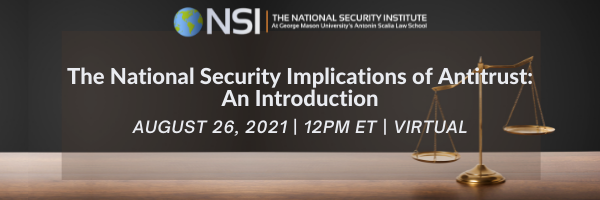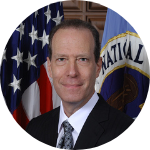
On Thursday, August 26th, from 12 – 1 PM ET, as part of NSI’s Tech Innovation and American National Security project, NSI hosted the first of a four-part series examining the national security implications of antitrust challenges at home and abroad. This first event provided an introduction of domestic and international antitrust laws, and examined the role of the U.S. tech industry in promoting U.S. national security and economic interests, including providing historical frameworks leading up to the current call by U.S. lawmakers to introduce antitrust lawsuits to protect consumers here in the United States. Panelists included:
- Ashley Baker, Director of Public Policy, Committee for Justice
- Mike Davis, Founder and President, Internet Accountability Project (IAP)
- Glenn Gerstell, Senior Adviser (Non-resident), International Security Program, Center for Strategic & International Studies
- Professor Joshua Wright, Executive Director of the Global Antitrust Institute
- Jamil N. Jaffer, Founder and Executive Director of the National Security Institute (moderator)
The National Security Implications of Antitrust Home and Abroad Series Overview: Throughout much of the 20th century, the United States has led the world in technological innovation – with this innovation driving sustained economic growth and underpinning U.S. global military capabilities. However, today, U.S. tech companies face antitrust challenges at home and abroad. This four event series will provide an overview of domestic and international antitrust laws and how these regulations and legal challenges impact U.S. and foreign tech companies, and explore how notwithstanding these antitrust challenges, the U.S. should position itself to preserve its preeminent role in leading technological innovation and to protect vital U.S. security interests. You can find more information about the Antitrust series here.
Our series continues with:
- National Security Implications of Antitrust: America’s Allies – September 2021
- National Security Implications of Antitrust: America’s Enemies – October 2021
- National Security Implications of Antitrust: America’s The Homefront – December 2021
This event features:

Ashley Baker is the Director of Public Policy at the Committee for Justice. Her focus areas include the Supreme Court, regulatory policy, antitrust, and judicial nominations. Her writing has appeared in Fox News, USA Today, The Boston Globe, The Hill, RealClearPolitics, The American Spectator, and elsewhere. She is also the founder of the Alliance on Antitrust coalition and has testified before the United States Senate on the topic of antitrust law.
Baker is an active member of the Federalist Society, where she serves as a member of the Regulatory Transparency Project’s Antitrust & Consumer Protection and Cyber & Privacy working groups. As a member of the Republican National Lawyers Association, she has served as a speaker on the Supreme Court and the federal judiciary. As an expert on the judicial nominations process, Baker worked closely on the efforts to confirm Justices Neil Gorsuch, Brett Kavanaugh, and Amy Coney Barrett.

Mike Davis is the founder and president of the Internet Accountability Project (IAP), an advocacy organization fighting to rein in Big Tech. As the former Chief Counsel for Nominations to Senate Judiciary Chairman Chuck Grassley, Davis also leads the Article III Project (A3P), which defends constitutionalist judges and the rule of law, along with the Unsilenced Majority, an organization dedicated to opposing Cancel Culture and fighting back against the woke mob and their enablers.
Davis has served in all three branches of the federal government, including for President George W. Bush, the Justice Department, House Speaker Newt Gingrich, and current Supreme Court Justice Neil Gorsuch. Davis also led the outside support team for Justice Gorsuch’s successful confirmation to the Supreme Court.
 Glenn S. Gerstell served as the general counsel of the National Security Agency (NSA) and Central Security Service (CSS) from 2015 to 2020. He has written and spoken widely about the intersections of technology and national security and privacy. Prior to joining the NSA, Mr. Gerstell practiced law for almost 40 years at the international law firm of Milbank, LLP, where he focused on the global telecommunications industry and served as the managing partner of the firm’s Washington, D.C., Singapore, and Hong Kong offices. Mr. Gerstell served on the President’s National Infrastructure Advisory Council, which reports to the president and the secretary of homeland security on security threats to the nation’s infrastructure, as well as on the District of Columbia Homeland Security Commission. A graduate of New York University and Columbia University School of Law, Mr. Gerstell is an elected member of the American Academy of Diplomacy and a member of the Council on Foreign Relations. Earlier in his career, he was an adjunct law professor at the Georgetown University Law Center and New York Law School. He is a recipient of the National Intelligence Distinguished Service Medal, the Secretary of Defense Medal for Exceptional Civilian Service, and the NSA Distinguished Civilian Service Medal.
Glenn S. Gerstell served as the general counsel of the National Security Agency (NSA) and Central Security Service (CSS) from 2015 to 2020. He has written and spoken widely about the intersections of technology and national security and privacy. Prior to joining the NSA, Mr. Gerstell practiced law for almost 40 years at the international law firm of Milbank, LLP, where he focused on the global telecommunications industry and served as the managing partner of the firm’s Washington, D.C., Singapore, and Hong Kong offices. Mr. Gerstell served on the President’s National Infrastructure Advisory Council, which reports to the president and the secretary of homeland security on security threats to the nation’s infrastructure, as well as on the District of Columbia Homeland Security Commission. A graduate of New York University and Columbia University School of Law, Mr. Gerstell is an elected member of the American Academy of Diplomacy and a member of the Council on Foreign Relations. Earlier in his career, he was an adjunct law professor at the Georgetown University Law Center and New York Law School. He is a recipient of the National Intelligence Distinguished Service Medal, the Secretary of Defense Medal for Exceptional Civilian Service, and the NSA Distinguished Civilian Service Medal.
 Joshua D. Wright is the Executive Director of the Global Antitrust Institute and holds a courtesy appointment in the Department of Economics. On January 1, 2013, the U.S. Senate unanimously confirmed Professor Wright as a member of the Federal Trade Commission (FTC), following his nomination by President Obama to that position. He rejoined Scalia Law School as a full-time member of the faculty in Fall 2015.
Joshua D. Wright is the Executive Director of the Global Antitrust Institute and holds a courtesy appointment in the Department of Economics. On January 1, 2013, the U.S. Senate unanimously confirmed Professor Wright as a member of the Federal Trade Commission (FTC), following his nomination by President Obama to that position. He rejoined Scalia Law School as a full-time member of the faculty in Fall 2015.
Professor Wright is a leading scholar in antitrust law, economics, intellectual property, and consumer protection, and has published more than 100 articles and book chapters, co-authored a leading antitrust casebook, and edited several book volumes focusing on these issues. Professor Wright also served on the editorial board of the Supreme Court Economic Review, the Antitrust Law Journal, and the International Review of Law and Economics. Professor Wright’s teaching and interests include Antitrust, Contracts, Administrative Law, Law and Economics, Intellectual Property and Antitrust, and Quantitative Methods. Professor Wright was awarded the Paul M. Bator Award by the Federalist Society in 2014 to “an academic who demonstrated excellence in legal scholarship, a commitment to teaching, a concern for students, and who has made a significant public impact.”
